Leather care mistakes can result in irreversible damage to your expensive footwear. One of the most common errors is the application of waterproofing spray on smooth leather. While these sprays may seem like a quick fix for protecting your shoes, they can block essential nutrients from reaching the leather, leading to dryness and cracking over time. Smooth leather shoes are inherently designed with natural water-resistant properties embedded in their grain layer. To maintain their durability, they require proper nourishment through shoe creams and waxes. Instead of resorting to sprays, choose high-quality leather conditioners and wax polishes that not only protect but also nourish the leather, ensuring its longevity while keeping its natural characteristics intact.
Mastering Effective Leather Protection Techniques for Longevity
To prolong the lifespan of your leather items, it is vital to understand their protective qualities. Full grain leather is equipped with natural water-resistant properties due to its tightly woven fiber structure. However, maintaining these properties requires consistent and meticulous care. The durability of your leather goods is directly influenced by the attention and care they receive. Utilizing waterproofing sprays can compromise the leather’s ability to breathe, which may lead to severe damage over time if not properly managed. Understanding these principles is essential for preserving your leather items effectively.
Uncovering the Unique Benefits of Full Grain Leather
After undergoing the tanning process, full grain leather retains its original surface layer, which offers superior natural protection. Leather products made from this material feature an intact grain layer that provides resistance against water and wear. This top layer, rich in natural oils and fibers, creates a protective barrier, making additional waterproofing sprays unnecessary and potentially harmful to the leather's health. Embracing the natural advantages of full grain leather can significantly enhance the lifespan of your shoes.
Comprehending Leather's Moisture Regulation and Aging Process
Grain leather must retain its ability to absorb and release moisture efficiently. The pores within your leather facilitate its capacity to breathe and manage moisture, keeping it supple and preventing unsightly cracking. However, using waterproofing sprays can seal these pores, restricting vital airflow and disrupting the natural moisture equilibrium. Furthermore, as leather ages, it requires appropriate nourishment through conditioning products. When waterproofing sprays are applied, they form a barrier that blocks essential conditioning oils from penetrating the leather, resulting in dryness and brittleness over time. Regularly applying leather cream allows your leather to age gracefully, developing a rich and desirable patina that enhances its character.
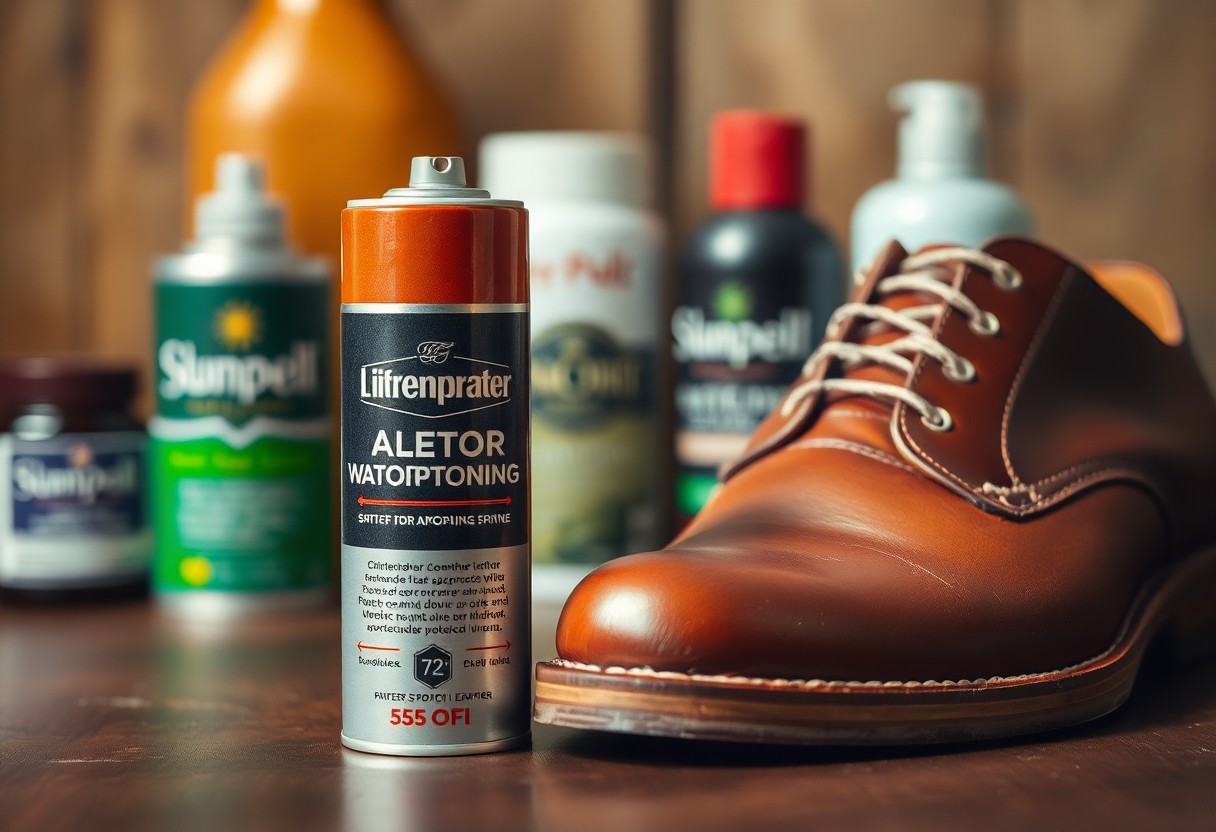
Steering Clear of the Common Pitfalls of Waterproofing Sprays
Many people mistakenly believe that waterproofing spray is the ultimate solution for protecting their leather shoes. However, this prevalent practice can lead to significant harm to your footwear. While these sprays may initially provide a protective barrier against water penetration, they simultaneously obstruct vital nutrients from reaching the leather, paving the way for potential long-term deterioration.
Disproving Common Misconceptions About Leather Care
Due to the influence of aggressive marketing campaigns and well-intentioned advice from shoe store staff, you may have been led to believe that waterproofing spray is essential for all types of leather shoes. This myth has been perpetuated by many retailers, largely due to the high profit margins and frequent repurchase rates associated with these products. In truth, regular smooth leather possesses inherent protective qualities that do not necessitate additional spray-on barriers for effective safeguarding. Recognizing this reality can help you make more informed decisions about leather care.
Analyzing Immediate Benefits Versus Long-term Effects
The damage to your leather shoes begins when waterproofing sprays create a barrier that prevents essential oils and conditioning agents from saturating the leather. While you may notice an initial increase in water resistance, your leather gradually becomes dry and brittle when deprived of the vital nourishment it needs. The consequences of using waterproofing sprays on smooth leather extend beyond superficial protection. Your leather requires consistent nourishment to maintain its flexibility and durability. When shoe creams and conditioners cannot penetrate the leather due to the spray barrier, the material risks cracking and deterioration, significantly shortening your shoes’ lifespan. Natural waxes and suitable conditioning treatments provide superior long-term protection while promoting the health of the leather.
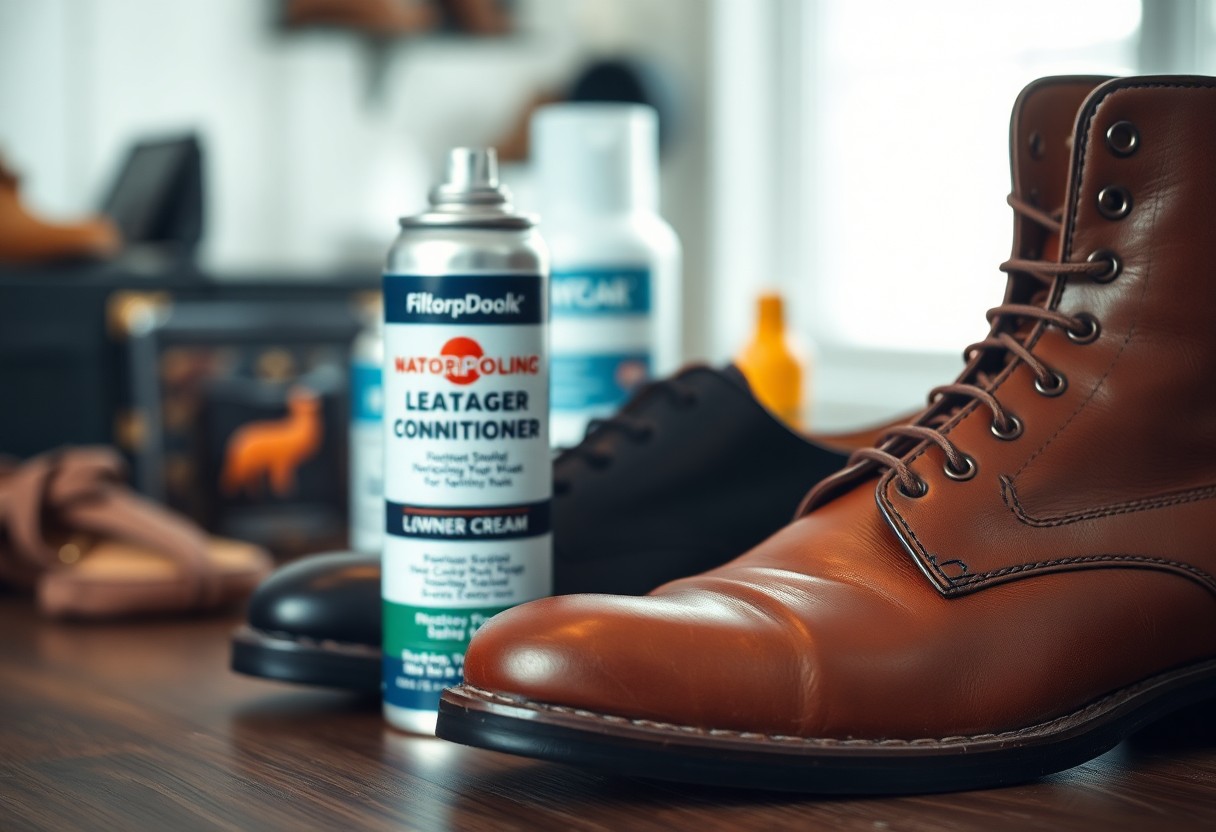
Diving Deep Into the Science Behind Leather Care
A key component of effective leather care is understanding its molecular structure. The collagen fiber networks within your leather shoes require both protection and nourishment. When products are applied to leather, they can either coat the fibers or penetrate their depths. This interaction is vital for the long-term health of your leather shoes and determines how well they will withstand daily wear and tear.
Appreciating the Necessity of Nourishing Leather
It's crucial to acknowledge that your leather shoes require regular nourishment to maintain their quality. The natural oils within your leather shoes help prevent cracking and sustain flexibility. Over time, these oils diminish due to typical wear and environmental exposure. To uphold the leather’s structural integrity, it is essential to replenish these oils through careful conditioning, ensuring that your shoes remain in optimal condition.
Recognizing the Barrier Effects of Waterproofing Sprays
One of the most significant issues with waterproofing sprays is their propensity to form a barrier. When applied to smooth leather, these sprays create an impermeable layer that obstructs both water and essential nutrients. This barrier prevents your leather care products from penetrating the surface effectively, leading to a gradual decline in the leather’s overall quality and health over time. Understanding this can help you avoid unnecessary damage.
The barrier created by waterproofing sprays introduces a problematic cycle for your shoes. While these sprays effectively block water, they also hinder the absorption of conditioning products that are vital for maintaining the leather's health. Consequently, the leather may look protected on the surface but is actually dehydrating and becoming brittle beneath. Silicone-based sprays are particularly harmful, forming a permanent barrier that is difficult to remove without causing damage to the leather.
Implementing Proven Methods for Effective Leather Protection
Contrary to popular belief, your smooth leather shoes necessitate targeted care methods that align with the natural properties of full-grain leather. The optimal approach integrates traditional techniques with products designed to enhance the leather’s inherent protective qualities, ensuring immediate protection and long-lasting durability for your footwear.
Discovering the Advantages of Wax-based Solutions
One of the most effective alternatives to waterproofing sprays is premium wax-based products. These solutions work in harmony with your leather’s natural grain rather than against it. Applying wax polish creates a protective barrier that still allows the leather to breathe, making it especially advantageous for toe caps and areas subject to high wear. Embracing wax-based solutions can significantly improve the overall longevity of your leather shoes.
Maximizing Benefits from Cream and Conditioner Applications
Unlike traditional spray treatments, leather creams and conditioners provide essential nourishment while preserving the leather’s natural protective properties. Your shoes benefit from oils that penetrate deeply into the material, preventing drying and cracking. Additionally, regular application of cream and conditioner creates a cumulative effect that enhances leather quality over time. The natural oils present in these products help support the leather’s flexibility and strength while allowing it to develop a beautiful patina. It is advisable to apply these products every 4-6 wears to maintain optimal leather condition.
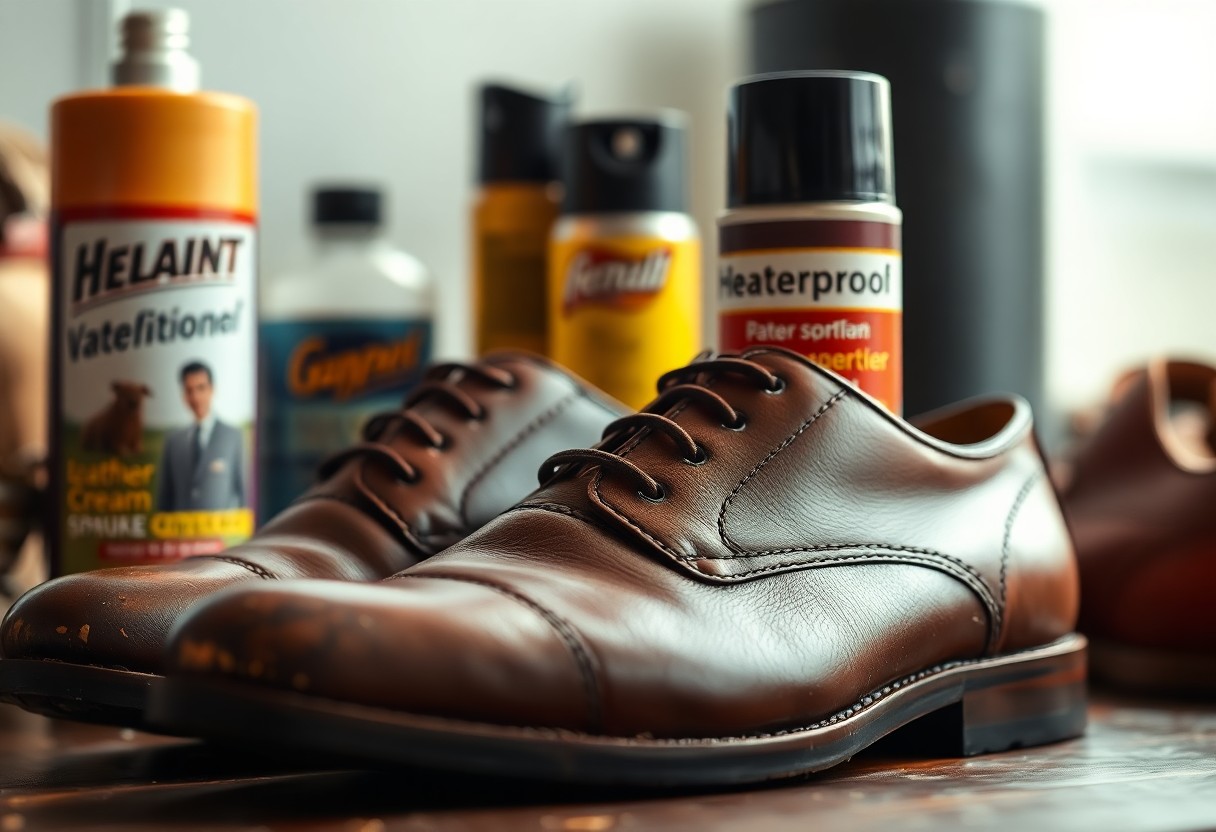
Identifying Suitable Scenarios for Waterproofing Spray Application
Unlike smooth leather, certain materials greatly benefit from waterproofing sprays. These products create an effective water-resistant barrier on specific materials that lack intrinsic protection. Waterproofing sprays are particularly useful for suede, nubuck, and various textiles, where the material structure does not offer natural moisture resistance.
Enhancing Suede and Nubuck with Waterproofing Spray
When you apply waterproofing spray to your suede or nubuck shoes, you significantly enhance their resistance to moisture damage. Although many contemporary suede materials come pre-treated with factory waterproofing, applying additional protection can help maintain this defense over time. The application of spray creates a protective barrier that effectively prevents water from penetrating these delicate materials, ensuring they remain in excellent condition.
Ensuring Adequate Protection for Textile Footwear
In addition to leather alternatives, textile footwear requires specialized protection against water damage. Materials such as canvas, mesh, and synthetic fabrics can achieve enhanced water resistance through proper spray application. Most textile materials are naturally absorbent, rendering them susceptible to water damage and staining.
Furthermore, waterproofing sprays for textiles help maintain the shape and color of your shoes. The barrier they establish also prevents dirt and debris from becoming embedded in the fabric fibers. It is advisable to reapply the spray every 3-4 months for optimal protection, depending on the frequency of wear and the prevailing weather conditions.
Expert Insights on Best Practices for Leather Care
Not all leather treatments are created equal. Industry experts strongly advise against the use of waterproofing sprays on smooth leather. Your full-grain leather shoes require specialized care to allow them to breathe and absorb nourishing treatments effectively. Using inappropriate products can lead to leather damage costing hundreds of dollars, underscoring the importance of proper care techniques.
Expert Insights from Tannery Specialists
To preserve the quality of leather, tannery specialists emphasize that full-grain leather naturally possesses water-resistant properties in its outer layer. Maintaining the leather's protective qualities requires the application of oils and waxes. Waterproofing sprays can obstruct these essential treatments from reaching the leather, leading to diminished quality and longevity.
Guidance from Professional Cobblers
For the long-term preservation of leather, professional cobblers advocate for the use of wax-based products over waterproofing sprays. Your shoes will flourish when treated with products that both protect and nourish the leather. Data suggests that 90% of premature leather damage results from the use of incorrect care products, highlighting the need for informed choices in leather maintenance.
By following proper leather care practices, your shoes can enjoy an impressive lifespan of 15-20 years instead of just 2-3 years with inadequate maintenance. Traditional wax treatments enable leather to retain its natural attributes while providing effective moisture protection. Your investment in quality leather footwear deserves meticulous care that preserves both its aesthetic appeal and durability.
Essential Takeaways for Optimal Leather Care
Your smooth leather shoes need appropriate care that excludes waterproofing sprays. Instead, opt for nourishing shoe creams and protective waxes that sustain the leather while effectively repelling water. Full-grain leather inherently possesses natural protective qualities due to its grain structure, and waterproofing sprays may inhibit essential oils from permeating, leading to dryness and cracking. Reserve waterproofing sprays for suede, nubuck, or textile footwear where they can be beneficial. By selecting the right products, you can protect your leather shoes and ensure their longevity.
Frequently Asked Questions About Leather Care
Q: Why is waterproofing spray harmful to smooth leather shoes?
A: Waterproofing spray creates a barrier on leather that obstructs essential oils and conditioners from penetrating the material. While it provides water protection, it hinders the necessary nourishment of the leather, leading to drying and potential cracking over time, ultimately reducing the lifespan of your shoes.
Q: What alternatives should I consider instead of waterproofing spray on smooth leather shoes?
A: Consider using a combination of shoe cream and wax polish instead. Shoe cream delivers essential oils to nourish the leather, while wax polish forms a protective layer that helps repel water. This method works in harmony with the natural protective properties of full-grain leather, ensuring the health of the leather while providing effective water resistance.
Q: Which types of footwear can I safely use waterproofing spray on?
A: Waterproofing spray is suitable for materials such as suede, nubuck, and textiles. These materials do not possess the natural protection found in smooth leather and thus benefit from the protective barrier created by waterproofing sprays. Many modern suedes and nubucks may already have factory waterproofing treatments, but additional spray applications can enhance and maintain this level of protection.
The Article Why you shouldn’t use waterproofing spray on regular smooth leather and better alternatives appeared first on My Shoes Finder
The Article Waterproofing Spray on Smooth Leather: Risks and Alternatives Was Found On https://limitsofstrategy.com
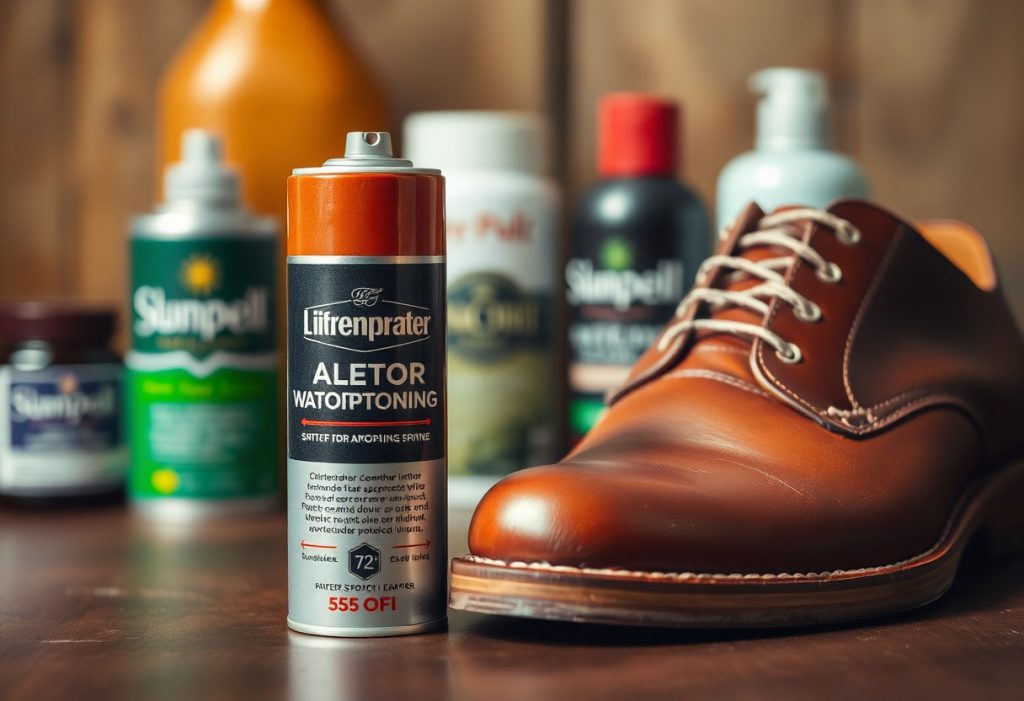

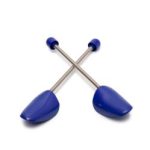
Your insights on the common pitfalls of leather care resonate strongly with me, especially regarding the misuse of waterproofing sprays. I’ve certainly fallen into that trap before, and it’s alarming to think about the long-term damage that can occur from such seemingly harmless products. As someone who values quality craftsmanship in footwear, understanding how to properly care for smooth leather has become a priority.
It’s great to hear your thoughts on the potential pitfalls of leather care, especially with waterproofing sprays. Many people don’t realize just how sensitive high-quality leather is, and some of these seemingly harmless products can lead to unintended consequences. When applied incorrectly or too liberally, waterproofing sprays can create a sort of barrier that prevents the leather from breathing, which can ultimately lead to issues like cracking or mold.
You’ve highlighted an incredibly important aspect of leather care that often gets overlooked. The tendency to reach for waterproofing sprays stems from a genuine desire to protect our investments, especially given the price tag associated with quality footwear. However, as you’ve pointed out, the long-term impact of these quick fixes can be detrimental.